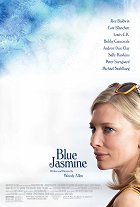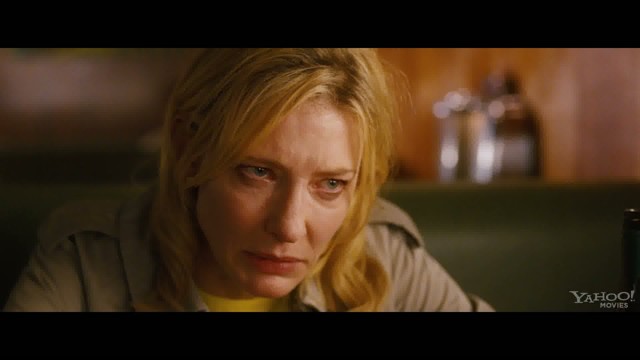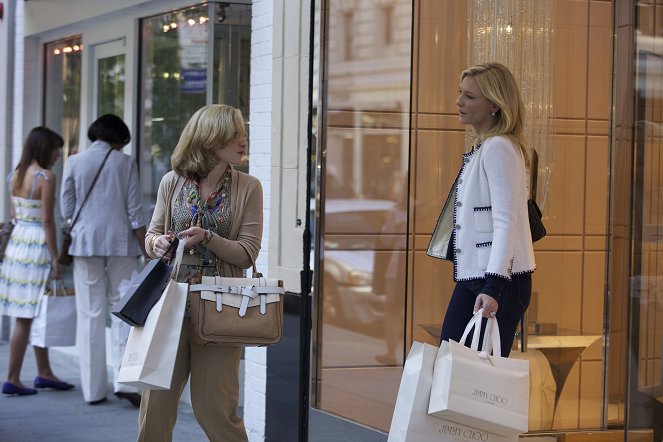Directed by:
Woody AllenScreenplay:
Woody AllenCinematography:
Javier AguirresarobeCast:
Cate Blanchett, Alec Baldwin, Sally Hawkins, Bobby Cannavale, Andrew Dice Clay, Peter Sarsgaard, Louis C.K., Alden Ehrenreich, Michael Stuhlbarg, Max Casella (more)VOD (2)
Plots(1)
Jasmine French used to be on the top of the heap as a New York socialite, but now is returning to her estranged sister in San Francisco utterly ruined. As Jasmine struggles with her haunting memories of a privileged past bearing dark realities she ignored, she tries to recover in her present. Unfortunately, it all proves a losing battle as Jasmine's narcissistic hangups and their consequences begin to overwhelm her. In doing so, her old pretensions and new deceits begin to foul up everyone's lives, especially her own. (official distributor synopsis)
(more)Videos (3)
Reviews (10)
“What will happen when there’s no more Woody?” someone wrote in their review on a Woody Allen movie. I keep
asking myself that when I watch almost every single one of his movies. No one else can write such dialogue. No one else
can portray characters in this way and have them played by such aptly chosen actors who, for just a small paycheck,
enjoy every line. Human, intelligent, sensitive and conveyed with a light ironic touch, Blue Jasmine is also sad, making
you sympathize with the protagonist.
()
A fantastic social satire and a masterfully drawn probe of the age-old rivals – poverty and wealth. But Woody Allen is not so transparent and silly idealistic as to show that being poor can be cool and being rich, or the habits and attitudes of the rich, are actually superficial and bad. He goes much further and blends the two worlds in a sophisticated and very sober way, showing even the complete opposites, while eviscerating and then presenting perfectly clean real-life situations every two minutes or so. When someone makes documentaries about animals or flora, it's fine, when Woody Allen makes documentaries about people, it's even more interesting.
()
Jeanette did two things in her life - she changed her name to the romantically sounding Jasmine and seduced a successful businessman. The latter guaranteed her a comfortable life full of shopping, fun, and a sense of importance. Social status meant everything to her and she confirmed it through a series of expensive rituals. One day, along with the fall of her husband, her previous certainties collapse, and, one might say, a sobering up occurs. But alas, Jasmine decides to retreat into a world of illusions. She faces the inevitable incursions of unpleasant reality with hysterical defensive reactions. With her usual self-assurance, she decides to take advantage of her step-sister's goodwill and moves into her apartment. Woody used the same model situation that Tennessee Williams arranged in his famous drama "A Streetcar Named Desire." He directed it elsewhere, though, and certainly doesn't copy the aforementioned title. The film can be simplistically seen as a straightforward critique of snobbery and at the same time as a brilliant acting creation by two great actresses. Alongside the famous Cate Blanchett, the equally talented Sally Hawkins excels, and also has great comedic potential. In the second aspect, Jasmine's character functions as a symbol of the blindness of those who refuse to admit that times are changing and that there are very few things that do not need to adapt to the passage of time. Industrial sectors, social classes, countries, and even entire civilizations find themselves in Jasmine's position and react similarly laughably and dysfunctionally as she does. The film is more of a comedy than a drama. However, it is a bittersweet comedy and one that provokes reflection rather than bursts of laughter. Overall impression: 85%.
()
The best Allen in recent years... There is actually only one thing that hurts this film - when one perceives it as another of the director's parodies and caricatures of superficial petty bourgeoisie and snobbery. But this film is much more of a tragedy about lies and endless hypocrisy, a tragedy of a character who cannot be himself, even if he is himself. The functional mirror structure, in which Allen places a (seemingly) comic monologue at the beginning and a clearly tragic monologue at the end, well reflects the path that the viewer must find with the withdrawn, unpleasant and unsympathetic protagonist. Jasmine has a hard time laughing / smiling, and it's hard to take a clear position on her and it's hard to judge what role she should specifically play in the testimony - is it a self-parody, an ironic smile to superficiality, a serious character...? The protagonist is as unclassifiable as the chameleon and in every detail the brilliant performance of Cate Blanchett, who undoubtedly played her life role on the verge of sacrificing her appearance (in some scenes she is not even recognizable). And the bitter old man Allen unfolds a scathing anti-tale about a crumbling life so consistently and ruthlessly that I had to collect myself for a few hours after the film ended. It's good to know that Woody can still do that. And that he is still able to make a risk-evoking film like the Coens’ A Serious Man (and not only because Michael Stuhlbarg is running around in this film again). Dark, sardonic, brilliant, one of the surprises of the year.
()
Like the first part of Kieslowski’s Three Colours trilogy, Allen’s tragicomic extension of A Streetcar Named Desire is in a blue mood. Blue, which for the emotionally fragile female protagonist is a symbol of tranquillity, is inserted into the film with frequent shots of the sea (which may be one of the reasons that Allen shot the film in San Francisco), and blue is also the colour of the moon in the song that Jasmine nostalgically recalls. The clear classification of the characters in Tennessee Williams’s play gives way to the destabilisation of all roles. With minor success, the two sisters seek their place among men. They are just as unclassifiable in terms of their nature as the film itself is terms of its genre as it oscillates between bitter comedy and pure tragedy. The insertion of current events through numerous flashbacks contribute to the “dual” structure of the narrative. Allen thoughtfully deals with the opposing “before” and “after” lifestyles and, more generally, the lifestyles of the rich and the poor (so the film could be credited with having a slight element of social criticism), and with the contradiction of Jasmine as passive prey and active woman/breadwinner. However, none of the positions and oppositions is permanent or impervious, so the protagonist does not cease to be dependent on others and does not definitively renounce her manners of a well-to-do lady upon arriving at her sister’s place. Jasmine’s sister once looked up to her; if Jasmine wants to survive in her new surroundings and conditions, she must now look up to her sister (both figuratively and literally, as Ginger dominates the shots on her own turf, while Jasmine is a passive beauty and a pampered queen in the world of luxury that her husband provided for her). The restrained camerawork (forget the neuroticism of Husbands and Wives; this film has a much smoother style) helps us to find our bearings in this shifting of forces and changing of roles, which are made authentic by the performances of the two lead actresses (the men are also superbly cast, but they certainly don’t play first fiddle, as they more or less there just to help move things along). Blanchett brings a theatrical loftiness to her portrayal of Jasmine, who literally cannot step out of here role, thus creating a sharp contrast with the more down-to-earth acting of the equally convincing Hawkins. Despite the film’s occasional formalistic rigidity irritating reluctance to give up on making jokes in places and the forcible insertion of themes involving crises, Blue Jasmine is, in comparison with Allen’s previous films, mostly just variously amusing puns, a decently complex study of character collapse and, after quite a long time, a Woody Allen film that the director spent enough time working on that I want to see it more than once. 75%
()



Ads